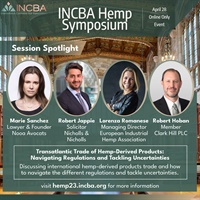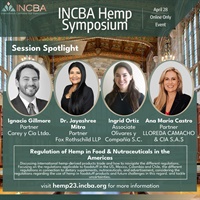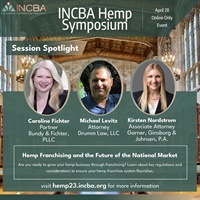
- Average Rating:
- 13
- Bundle(s):
- Hemp Symposium 2023 On-Demand Bundle
- Categories:
- Hemp | Hemp Law
- Faculty:
- Marie Sanchez | Robert Hoban | Lorenza Romanese | Robert Jappie
- Duration:
- 1 Hour 4 Minutes
- Format:
- Audio and Video
- SKU:
- INCBA042823transatlanticOD
- License:
- Access for 6 month(s) after purchase.
- Short Description:
- In this session the panelists will discuss international hemp-derived products trade. More specifically, the panelists will offer an overview of what transatlantic trade of hemp-derived products (food products, cosmetic products, vaping products…) for consumer use looks like with a particular focus on import and export of these products from the US market to the EU and/or the UK market(s) and from the EU and/or the UK to the USA.
- Price:
- $30.00 - $75.00
Tags: Hemp Symposium 2023

- Average Rating:
- 13
- Bundle(s):
- Hemp Symposium 2023 On-Demand Bundle
- Categories:
- Hemp | Hemp Law
- Faculty:
- Pamela Epstein | Courtney Moran, LL.M. | Shawn Hauser | Rusty Rumley
- Duration:
- 1 Hour 5 Minutes
- Format:
- Audio and Video
- SKU:
- INCBA042823farmbillOD
- License:
- Access for 6 month(s) after purchase.
- Short Description:
- In this session the panelist will set the stage by discussing the Agricultural Improvement Act, more commonly known as the Farm Bill; specifically, the watershed moment in 2018 where industrial hemp was provided a federally legal pathway. The panel will discuss the unintended consequences created by the definition and function of weight allowance for delta-9 THC and its application to manufactured hemp derived products. The impacts of the definition on the hemp industry, the regulated marijuana industry and overall public health.
- Price:
- $30.00 - $75.00
Tags: Hemp Symposium 2023

- Average Rating:
- 13
- Bundle(s):
- Hemp Symposium 2023 On-Demand Bundle
- Categories:
- Hemp | Hemp Law
- Faculty:
- Susan Burns | Rod Kight | Glenn McElfresh | Jessica Wasserman, JD
- Duration:
- 1 Hour 2 Minutes
- Format:
- Audio and Video
- SKU:
- INCBA042823microcosmOD
- License:
- Access for 6 month(s) after purchase.
- Short Description:
- Learn about the hemp-derived Minnesota Model and how it is viewed as a preview to what will happen on the federal level. As goes Minnesota, so goes the rest of the nation? Join local and national speakers for their analysis and predictions, who will also discuss novel/intoxicating hemp-derived cannabinoids and their regulation under both state and federal law, including Delta-8 THC, THC-O, and others.
- Price:
- $30.00 - $75.00
Tags: Hemp Symposium 2023

- Average Rating:
- 14
- Bundle(s):
- Hemp Symposium 2023 On-Demand Bundle
- Categories:
- Hemp | Hemp Law
- Faculty:
- Ignacio Gillmore | Dr. Jayashree Mitra | Ana Maria Castro | Ingrid Ortiz
- Duration:
- 1 Hour 3 Minutes
- Format:
- Audio and Video
- SKU:
- INCBA042823hempinfoodOD
- License:
- Access for 6 month(s) after purchase.
- Short Description:
- The panel will focus on the regulations applicable to foodstuff in the US, Mexico, Colombia and Chile. In particular, we will discuss different regulations in connection to dietary supplements, nutraceuticals, advertisement and further challenging issues for the industry, to later focus on the approach that these regulations have regarding the use of hemp in foodstuff products and future challenges in this regard.
- Price:
- $30.00 - $75.00
Tags: Hemp Symposium 2023

- Average Rating:
- 10
- Bundle(s):
- Hemp Symposium 2023 On-Demand Bundle
- Categories:
- Hemp | Hemp Law
- Faculty:
- Caroline Fichter | Kirsten Nordstrom | Michael Levitz
- Duration:
- 1 Hour
- Format:
- Audio and Video
- SKU:
- INCBA042823franchisingOD
- License:
- Access for 6 month(s) after purchase.
- Short Description:
- The franchise business model offers hemp business owners the opportunity to grow their brand nationally while reducing their startup and operational costs. It offers prospective hemp franchisees the chance to own their own business while benefiting from an established brand and operational system. But a poorly created franchise system or an “accidental” franchise, can expose hemp businesses to the risk of regulatory investigation, litigation, and the loss of key IP such as trademarks and trade secrets. Conflicting state regulations and the lack of significant federal guidance makes franchising a hemp business even more complex.
- Price:
- $30.00 - $75.00
Tags: Hemp Symposium 2023

- Average Rating:
- 17
- Bundle(s):
- Hemp Symposium 2023 On-Demand Bundle
- Categories:
- Hemp | Hemp Law
- Faculty:
- Jason Tarasek | Marie Sanchez | Kai-Friedrich Niermann | Andrea Steel
- Duration:
- 1 Hour 15 Minutes
- Format:
- Audio and Video
- SKU:
- INCBA042823caselawOD
- License:
- Access for 6 month(s) after purchase.
- Short Description:
- Case Law Update: A comprehensive update on recent Hemp case law
- Price:
- $30.00 - $75.00
Tags: Hemp Symposium 2023

Product Type
- Faculty:
- Marie Sanchez | Robert Hoban | Lorenza Romanese | Robert Jappie | Pamela Epstein | Courtney Moran | Shawn Hauser | Rusty Rumley | ....